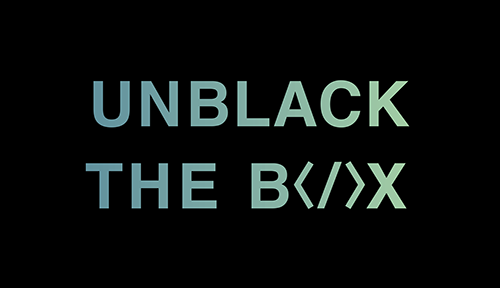Projects by UNBLACK THE BOX members
Entwicklungslinien digitaler Kultur, digitale Kulturtechniken und Wissenspraktiken
https://www.medienpaedagogik.uni-kiel.de/de/profil/entwicklungslinien-digitaler-kultur-digitale-kulturtechniken-und-wissenspraktiken
Digital technologies do not only represent a teaching resource or a pedagogical object; but they are also cultural products that have implications on the economic, political, social and aesthetic conditions that shape our interactions. The project aims to introduce students in teacher education to digitisation in terms of a cultural transformation process and enable them to scrutinise co-create contemporary and future developments.


DATAFIED – DATA For and In EDucation. Die Konstruktion der Schule im Prozess der Datafizierung
www.datafied.de
With the increasing datafication of schools, data have a growing influence on processes of decision-making in educational politics, school supervising authorities, school administrations, school leadership or teaching. This is accompanied by fundamental changes of roles (e.g. what constitutes a good teacher or a good school leader?) and their relationship to each other. The joint project describes these processes of change from different perspectives, based on secondary schools in four federal states.

Media Protect/ ECHT DABEI
https://www.alanus.edu/de/forschung-kunst/wissenschaftliche-kuenstlerische-projekte/detail/media-protect bzw. www.echt-dabei.de
How can children grow up healthily in the digital age? What are the competences and resources they need? What amount of media consumption is healthy and appropriate in relation to a child’s age? How can children learn to use media as a chance in the long term, while avoiding risks? “ECHT DABEI – Gesund groß werden im digitalen Zeitalter” helps parents and pedagogues to find answers to these questions.

Onlinelabor für Digitale Kulturelle Bildung
https://digitalekultur.medienpaedagogik.uni-kiel.de
Different tasks regarding technical, cultural and individual factors are meant to visualise unique approaches in using social media. After all, no two grains of sand are alike! Contributions can be shared in a public archive.

Critical Big Data & Algorithmic Literacy Network
https://www.bigdataliteracy.net/
International and interdisciplinary network of scientists and practitioners aiming to strengthen a critical reflection of datafication and algorithmisation and collect resources on education about big data. The network hosts a database of more than 160 ‚critical data literacy resources’ that can be used to raise awareness and educate about big data and datafication.

Data Justice Lab
https://datajusticelab.org
The Data Justice Lab at the Cardiff University (UK) investigates the relationship between datafication and social justice. Among others, the lab studies the use of automated decision-making systems in public services.

SMASCH – Smarte Schulen
https://www.smasch.eu/en/
The project SMASCH – Smarte Schulen at Helmut-Schmidt University Hamburg accompanies and supports schools in developing sustainable, pedagogically relevant and needs-oriented digitisation concepts that have a purposeful and targeted effect in the mid and long term. Hence, digitisation is not only regarded as a matter of technical equipment but as a driver of sustainable school development.

Medienbildung 360 Grad – Mündige Kita und Grundschule
www.alanus.edu/mb360
Media education 360 degrees is a comprehensive, critical and sustainable certification course for a (re)design of education in the digital age. The certification course addresses multipliers (trainers in initial and further education, media advisers,…) who would like to provide support on how successful education processes in the digital age can take place in nurseries, kindergartens and primary schools WITHOUT the use of digital technologies.

„Teaching about Data“ – Lernressource für PädagogInnen
https://privacyinternational.org/learning-resources/teaching-about-data-resource-educators
“Teaching about data” is an online resource intended to encourage and support pedagogues to educate about topics around data technology. Five chapters with brief video summaries each illustrate why we need more critical data education, which strategies have proven successful when educating about complex data topics, and which helpful resources and materials are already available about these topics. The website emerged from a cooperation between Ina Sander’s doctoral research project with the British NGO Privacy International.
